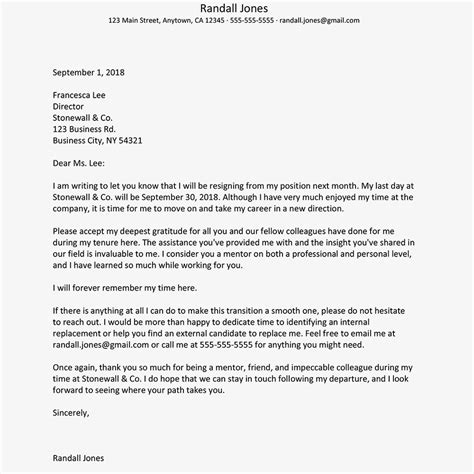Top Resignation Letter Examples For Success

Resignation is an inevitable part of any career path. Whether you are leaving a job due to better opportunities, personal reasons, or issues with your employer, it is important to leave on good terms. One of the best ways to do this is by writing a professional resignation letter. In this article, we will provide you with the top resignation letter examples for success, including templates and tips for writing a resignation letter that will help you maintain a positive relationship with your employer and leave a lasting impression.
Why is a Resignation Letter Important?
A resignation letter is a formal way of notifying your employer that you are leaving the company. It is a crucial communication tool that can help you maintain a positive relationship with your employer, even after you leave. A well-written resignation letter can help you:
What to Include in a Resignation Letter?
A resignation letter should be professional and concise. It should include the following:
Top Resignation Letter Examples for Success
1. Formal Resignation Letter Example
[Your Name]
[Your Address]
[City, State, Zip Code]
[Date]
[Employer’s Name]
[Employer’s Address]
[City, State, Zip Code]
Dear [Employer’s Name],
I am writing to inform you that I will be resigning from my position as [Your Position] at [Company Name], effective [Date of Resignation]. I have accepted a new opportunity and will be pursuing a different career path.
It has been an honor to work with such a wonderful team at [Company Name]. I am grateful for the opportunities and experiences that I have gained during my tenure here. I would like to thank you and the entire team for the support and guidance provided during my time at the company.
I am committed to making the transition as smooth as possible. Therefore, I am willing to assist in any way I can during the transition period. Please let me know how I can be of assistance.
Thank you again for the opportunity to be a part of [Company Name]. I wish the company continued success in the future.
Sincerely,
[Your Signature]
[Your Name]
2. Short Resignation Letter Example
[Your Name]
[Your Address]
[City, State, Zip Code]
[Date]
[Employer’s Name]
[Employer’s Address]
[City, State, Zip Code]
Dear [Employer’s Name],
Please accept this letter as formal notice of my resignation from my position as [Your Position] at [Company Name], effective [Date of Resignation].
Thank you for the opportunity to work with such an amazing team. I will always cherish my time at [Company Name] and the experiences that I gained here.
Best regards,
[Your Signature]
[Your Name]
3. Email Resignation Letter Example
Subject: Resignation – [Your Name]
Dear [Employer’s Name],
It is with a heavy heart that I am writing to inform you of my resignation from my position as [Your Position] at [Company Name], effective [Date of Resignation]. I have accepted a new opportunity that I believe will help me grow professionally.
I would like to thank you and the entire team at [Company Name] for the support and guidance that you have provided during my tenure here. It has been an honor to be a part of such an amazing team.
Please let me know how I can assist in making the transition period as smooth as possible. I am committed to ensuring that my work is completed and that all necessary information is passed on to my replacement.
Thank you again for the opportunity to work with [Company Name]. I wish the company continued success in the future.
Sincerely,
[Your Name]
Tips for Writing a Resignation Letter
1. Be Professional
Ensure that your resignation letter is professional and formal. It is important to maintain a positive relationship with your employer and colleagues, even after you leave.
2. Keep it Concise
Keep your resignation letter brief and to the point. It should be a maximum of one page long.
3. Provide a Reason for Your Resignation
If possible, provide a brief reason for your resignation. However, it is not necessary to provide a detailed explanation.
4. Offer to Help During the Transition Period
Offer to help during the transition period to ensure that the handover process is as smooth as possible.
5. Thank Your Employer and Colleagues
Thank your employer and colleagues for the opportunities and experiences that you gained during your tenure at the company.
Frequently Asked Questions (FAQs)
1. Is a resignation letter necessary?
Yes, a resignation letter is necessary as it is a formal way of notifying your employer that you are leaving the company.
2. What should I include in my resignation letter?
You should include the date of resignation, your full name and address, the name and address of your employer, a statement of resignation, the effective date of your resignation, a brief reason for your resignation (optional), a thank you message to your employer and colleagues, a willingness to help during the transition period, contact information for future correspondence, and your signature.
3. How should I format my resignation letter?
Your resignation letter should be professional and formal. It should be written in a business letter format, with a clear and concise message.
4. When should I submit my resignation letter?
You should submit your resignation letter at least two weeks before your planned last working day.
5. Can I resign via email?
Yes, you can resign via email. However, it is recommended that you also provide a hard copy of your resignation letter.
In conclusion
A resignation letter is an important document that can help you maintain a positive relationship with your employer and colleagues, even after you leave. By following the tips and examples provided in this article, you can write a resignation letter that will leave a lasting positive impression on your employer and colleagues.
